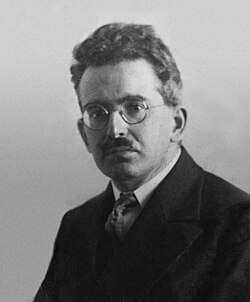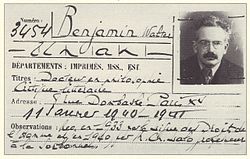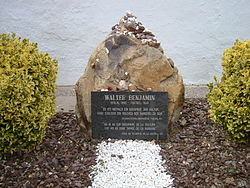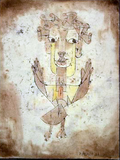Walter Benjamin
Walter Bendix Schönflies Benjamin (German: [ˈvaltɐ ˈbɛnjamiːn];[1] 15 July 1892 – 26 September 1940)[2] was a German philosopher, cultural critic, and translator.
Walter Benjamin | |
|---|---|
 | |
| Born | 15 July 1892 |
| Died | 26 September 1940 (aged 48) |
| Era | 20th-century philosophy |
| Region | Western Philosophy |
| School | Western Marxism |
Main interests | Literary theory, aesthetics, philosophy of technology, epistemology, philosophy of language, philosophy of history |
Notable ideas | Auratic perception, aestheticization of politics |
Influences
| |
Influenced
| |
Benjamin was born to a Jewish family in Berlin, then-German Empire.
He worked in many subjects such as German idealism, Romanticism, historical materialism, and Jewish mysticism. He helped aesthetic theory, media studies and Western Marxism grow.
Benjamin died by suicide by taking an overdose of morphine in Portbou at the French–Spanish border while attempting to escape from the Nazis at the age of 48.
Family
Jewish-East German judge and politician Hilde Benjamin was his brother's wife.
Walter Benjamin Media
Walter Benjamin's membership card for the Bibliothèque nationale de France (1940)
Walter Benjamin's Paris apartment at 10 rue Dombasle (1938–1940)
Paul Klee's 1920 painting Angelus Novus, which Benjamin bought in 1921 and compared to "the angel of history"
References
- ↑ Duden Aussprachewörterbuch (6 ed.). Mannheim: Bibliographisches Institut & F.A. Brockhaus AG. 2006.
- ↑ Witte, Bernd (1991). Walter Benjamin: An Intellectual Biography (English translation). Detroit, MI: Wayne State University Press. pp. 9. ISBN 0-8143-2018-X.
Other websites
![]() Media related to Walter Benjamin at Wikimedia Commons
Media related to Walter Benjamin at Wikimedia Commons
![]() Quotations related to Walter Benjamin at Wikiquote
Quotations related to Walter Benjamin at Wikiquote
- Walter Benjamin, at the Stanford Encyclopedia of Philosophy
- The Internationale Walter Benjamin Gesellschaft. In English and German. Archived 2005-02-18 at the Wayback Machine (Defunct)
- Walter Benjamin at Marxists.org
- Fragments of the Passagenwerk: The Arcades Project, Giles Peaker
- Aufklärung für Kinder, by Walter Benjamin. 30 broadcasts for German Radio between 1929–1932 specifically for children, maybe 7–14 or so, each consisting of a 20 minute talk or monologue.
- One Way Street: Fragments for Walter Benjamin (1993), by John Hughes. This documentary provides clear and accessible introductions to some of the central ideas in Benjamin's writings.
- Protocols to the Experiments on Hashish, Opium and Mescaline Archived 2009-12-27 at the Wayback Machine Translated by Scott J. Thompson, copyright March 25, 1997
- From 'Rausch' to Rebellion Archived 2009-07-28 at the Wayback Machine An introductory essay by Scott J. Thompson
- Paris, capitale du XIXe siècle In French
- Walter Benjamin Research Syndicate Archived 2004-12-20 at the Wayback Machine
- "Walter Benjamin for Historians", American Historical Review, Vol. 106, No. 5. December 2001.
- "Walter Benjamin on the idea of Progress" ...and the law of "uneven and combined development"
- Who Killed Walter Benjamin..., (Spain/The Netherlands/Germany, 2005, 73 min.) a documentary film about the circumstances of Benjamin's death by David Mauas




